#And I love the Job minisode
Text
It’s time to talk about the Laudanum Lesbians, Elspeth and Wee Morag. Right away, it’s pretty obvious that you’re supposed to draw parallels between them and Aziraphale and Crowley. When the viewer first meets Elspeth, we get this gruff girl who threatens the two of them and is established to be doing something “morally wrong”. Life hasn’t been kind to her, and she clearly doesn’t trust people. To really drive it home, she and Crowley are on the exact same page while they’re talking to Aziraphale and wheeling the body to the alley.
Then we meet Wee Morag, and it becomes apparent that every decision that Elspeth makes is to better their life together. She offers Wee Morag food (which is something our favorite demon is wont to do for his partner) and specifically oversells it as something fancier than it actually is. Wee Morag calls her an angel. It’s meant to be a little tongue and cheek since it’s in the presence of a literal angel, but it also serves as a way to show that while Elspeth may not be a Good person, that she at least cares about the person close to her.
Now for Wee Morag at this moment, we don’t get much from her aside from her obviously being the moral compass out of the two of them. She tells Elspeth that she's going to Hell literally two seconds after referring to her as an angel. The more important part of this interaction I would argue is Aziraphale’s response to Wee Morag. Some part of him recognizes a kindred spirit in her. He takes off his hat in a show of sincerity and says that it was lovely to meet her. This is important for later in the episode.
After they fail to sell the body, all three of them end up back in the alley with Wee Morag. Elspeth is again choosing to not trust Aziraphale despite his change of heart to do what he now knows is actually a good thing. Wee Morag starts off on the fence, worried about those souls that won’t get into Heaven. Elspeth tells her that she promised to help, and through everyone’s various methods of convincing (tempting may even be the better word as there is a demon sitting next to her when she agrees), Wee Morag says that she’ll do it because that’s what friends do. Regardless, she’s now had her change of heart. Although I would say hers is more driven by the same thing that drives Aziraphale to help with the Antichrist. It is fundamentally for her and Elspeth’s benefit, not the Greater Good per say, but she needs that reframing of doing the moral thing of upholding her promises and potentially helping people.
In the graveyard, Elspeth does all of the hardwork and Wee Morag holds the light both to assist how Elspeth sees, but also likely to help her keep watch. She’s filling a guardian role for Elspeth. Later when Elspeth sells her body, she even says “She only wanted to look after me.” Upon seeing the actual body (a priest’s body no less), Wee Morag realizes with horror what they’re doing - the potential moral ramifications stare her in the face. She ends up caught in the crossfire of a gun, and she dies for it.
Originally, I thought that Wee Morag’s death sets Crowley up to worry about what might potentially happen to Aziraphale in the future. In a way, I still think it does. She was the Good character helping the Bad character, and she pays dearly for it. His line “It’s a bit different when it’s someone you know, isn’t it?” while pointed at Aziraphale can be felt by everyone in the room. Elspeth has been dealing with death this whole episode, but her whole life is turned on its head when her ‘pal’ dies. Crowley recognizes that it’s the knowing part that actually causes something to hurt. (It’s one of the reasons why he doesn’t have many human friends. He does have a friend though, and it would absolutely gut him to lose him.)
The episode isn’t over though. We still have to watch someone else pay for stepping over the imaginary boundary of Good and Evil, except rather than it being Aziraphale, it’s Crowley. Like Wee Morag, he steps out of his usual role and helps Elspeth, and for that, he pays dearly. He gets dragged off to Hell to have whatever Demons do instead of a rude note done to him. After everything that’s happened, it’s no wonder why you get that panicked shout of “Crowley” from Aziraphale. They just watched the worst case scenario happen for people like them.
Also as another quick fun aside, both sets of characters are bound by something that allows them to not be able to carry out their actual dreams and goals. Elspeth and Wee Morag were bound by poverty while Aziraphale and Crowley are bound by their respective Head Offices.
#The 1941 minisode is probably my favorite#And I love the Job minisode#But I feel like we're sleeping on this one when it's just as good#good omens meta#good omens#meta#good omens season 2#Aziraphale#Crowley
595 notes
·
View notes
Text
btw when you're being mean to aziraphale this is who you're being mean to. hope this helps
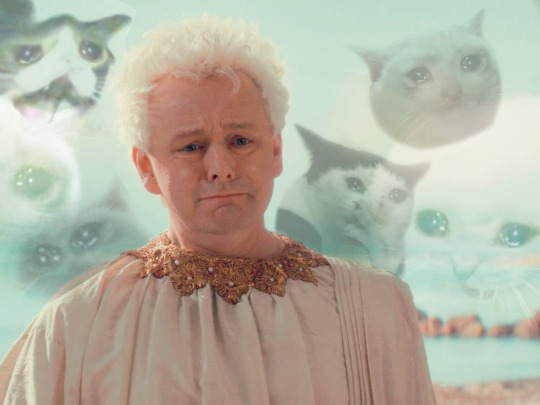
#good omens#aziraphale#good omens memes#good omens fandom#good omens s2#good omens shitpost#good omemes#go s2#poor little meow meow#michael sheen#job minisode#a companion to owls#staying as far away from fandom discourse as possible but i feel it needs to be said#he's a walking talking crying wet cat on the inside#and he needs a pat on the head maybe a lil kick to the butt. not all this backlash. peace and love on gomens earth#marcela talks#ghost(shit)posted by crowley#aziraphale defense squad#i cleary underestimated the emotional weight of his kittydog eyes. you're good
4K notes
·
View notes
Text
Sundays are for thinking about Just Enough of a Bastard Aziraphale and Little Bit of a Good Person Crowley
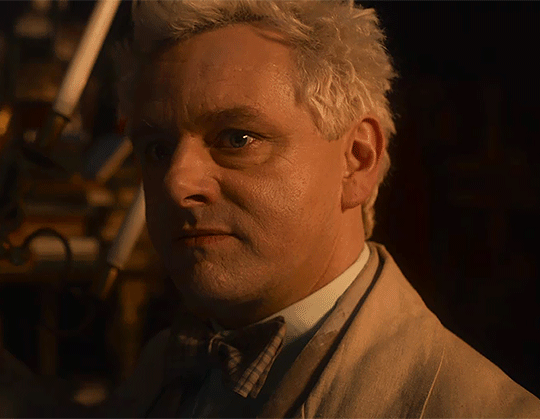

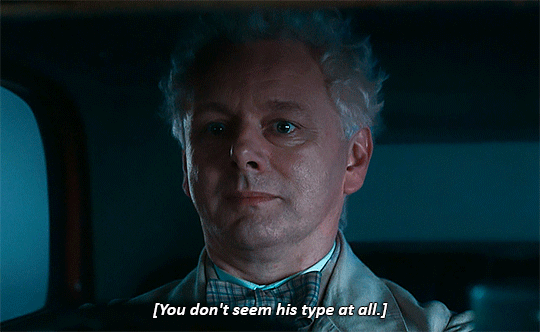
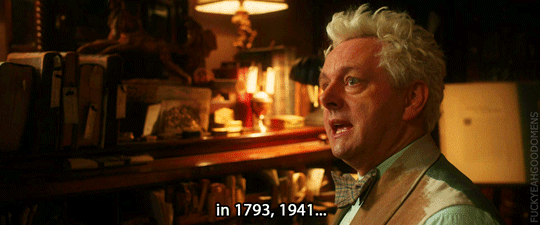
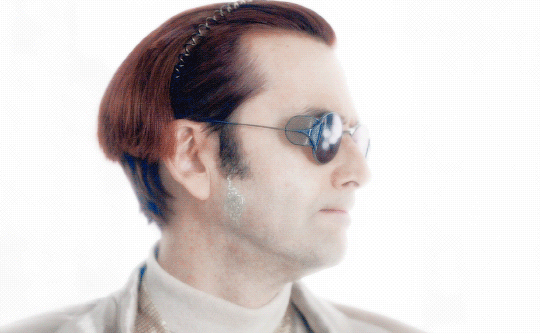
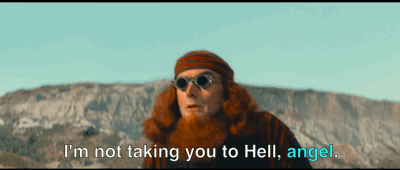
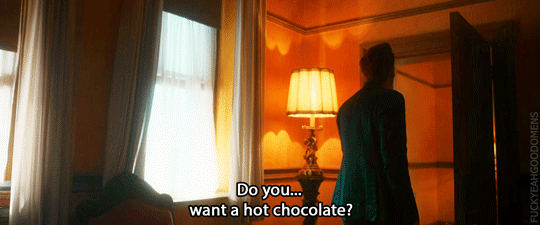
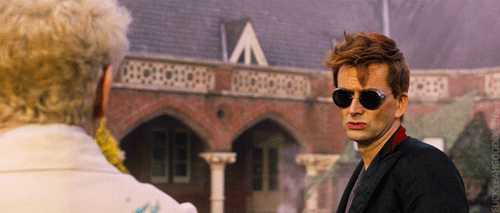
Reblog with your favourite examples, these are some of mine
#aziraphale is such a bastard#crowley is such a softy#i love them your honor#good omens#aziracrow#aziraphale#crowley#ineffable husbands#i am so weak for them#look at murials face#LOOK AT IT#i will never be over the Job minisode and how kind Crowley was
750 notes
·
View notes
Text
You know that wall color in the bookshop?

Methinks Aziraphale got the idea a long

time

ago.
(Also did they buy the entire world's stock of Va Va Voom paint for s2 sets or??)
#set designers and aziraphale on the same wavelength as far as their favorite color#please keep in mind that the exterior courtyard and interior of Job's house are this color#and yes this could be an unreliable narrator Aziraphale thing#and i love it either way#good omens#good omens s2#color in storytelling#honestly the color design of s2 is just#<chefs kiss>#va va voom#the job minisode#bildad the shuhite#crowley#ineffable husbands#aziraphale#aziracrow#a duck talks#good omens screencaps
475 notes
·
View notes
Text
Let's talk costuming: Avaunt!

So I think we can all agree that Aziraphale looks his most traditionally angelic in the Job minisode, no? In fact, all of the angels' costuming increases in drama for this particular episode. This is, obviously, a very deliberate choice on the part of wardrobe, so let's discuss.
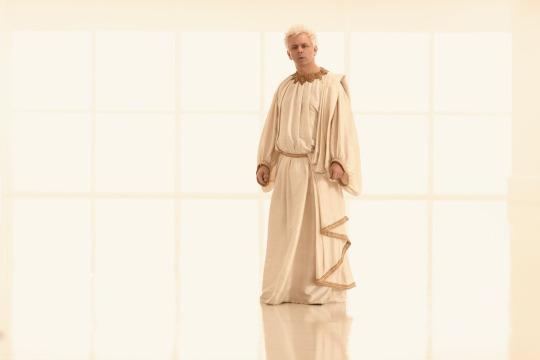
On a technical level, the biggest thing that stands out to me about this fabulous robe is the draping. Oh, the draping. It feels like a classic angel 'fit because on a very fundamental level, it is. A lot of what we think of as angelic draws on Renaissance artists' depictions, with flowing robes, fluffy wings, and glimmering halos. In art from this era, there is a strong attention to detail on the natural flow of fabrics that makes Renaissance sculpture so breathtaking, such as here: (The Ecstasy of St. Teresa, Bernini, 17th century CE)

It's this ability to make solid marble look like fine silk rippling with movement that leaves such a strong impression in my mind when I look at these kinds of works.
In painting, too, there is a similar effect. Something about the material culture of the Renaissance really lent itself to this style, perhaps fueled by the rise in new textile luxuries that occurred in vaguely the same period. This is seen especially strongly for angels, such as in the sculpture above, and in this painting: (The Annunciation to the Virgin, Botticelli, 15th century CE)
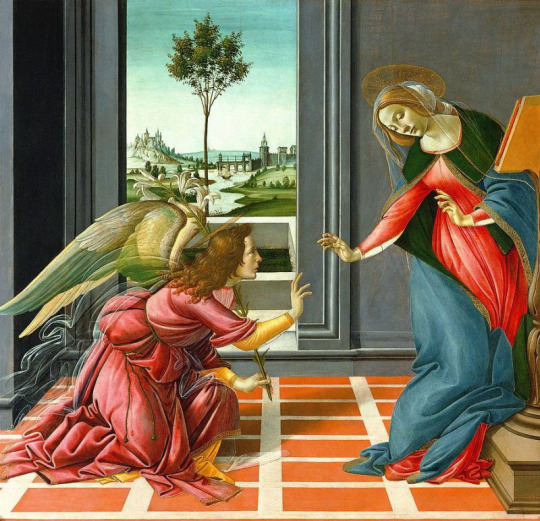
There's a stark contrast between the dress of the two figures. The virgin Mary is no less ornamentally or expensively dressed, but her style is rather minimalistic next to the angel's voluminous robing. It paints a very clear impression of angelic dress, and the designers for Good Omens would have been aware, in at least a small way, of the art history precedence for such a thing.
The poof of the sleeves, the tucks down the front, the little belt with the train tucked in, the gathers, the weight of the fabric, everything about this robe is constructed to carefully recreate the rather fantastical imagery of renaissance art. It's not necessarily an easy texture to nail down, given that the artists themselves had no concerns of gravity, comfort, or the way it would look in actual 3d motion, while our brave costumers were dealing with all three as well as a budget, time constraints, and the constant consideration that white fabric just gets dirty so easy.
Here's some of the other angels as well, so you can see how theirs reflect those same dramatic themes.

And then, of course, when costuming a show you have a second question: What does this mean for our character? Or rather, we know how, but WHY did they make him look so traditionally angelic?
Well, thematically, the Job minisode centers around Aziraphale's struggle with being a good angel and Crowley's struggle with being a good demon. Aziraphale is learning how to be an angel that follows along with heaven as far as we can, and he's so terribly torn up about it. He spends a lot of his time fretting about doing what's expected demanded of him, even if perhaps he doesn't believe it to be the right choice. Natural, then, that he should look the part of the perfect angel whilst sorting out these ethereal woes.
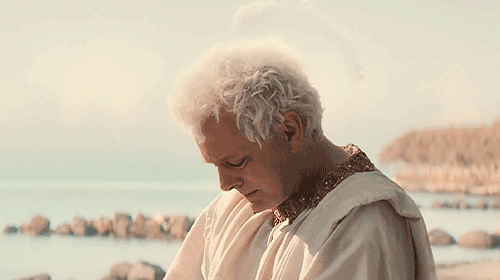
Crowley even draws attention to it himself, giggling a bit at the suggestion that Aziraphale, with his fluffy hair and flowing angelic garb, could possibly become a demon. And it is a rather silly mental image; the garment itself would be comically silly in really ANY other context at all. In the same manner, his performance of angelic archetype borders on excessive:
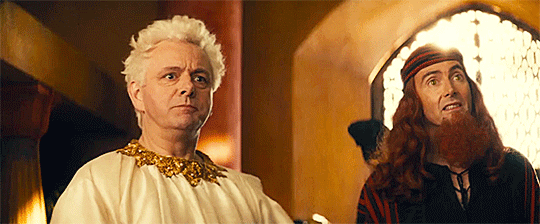
He's trying so desperately hard here to be the angel he wants to and is supposed to be. He's dressed the part, he's using his big scary angel voice, but deep down he's clinging to an identity that doesn't quite fit.
(You'll notice in this shot the distinct difference between his and Crowley's dress on the level of silhouette as well as color. We see this a lot from the two of them, but with the points I made above it felt worth pointing out in this particular scene)
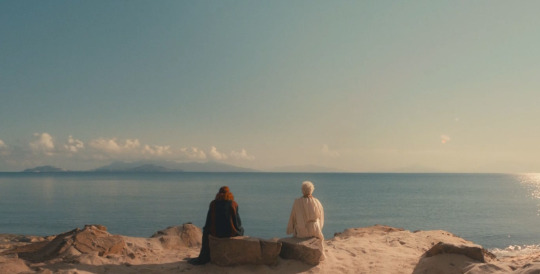
Here at the end, as he's coming to terms with the cracks in his heaven-given identity, his robe is largely in shadow, blurring out its startling whiteness. We do not see him dressed this way again. (He continues to wear white, obviously, but from here on out his style of dress mimics the human trends of the time rather than that classical angelic imagery)
#good omens analysis#art history#sometimes I am an academic weapon but only when it doesn't count#aziraphale good omens#job minisode#costume design#good omens#good omens costumes#aziraphale#michael sheen#historical clothing#good omens 2#neil gaiman#also I love the little human touch of that little bend in his fucking sleeve cuff when he says avaunt#like that's a fully real piece of clothing that he's wearing not something animated and sometimes you just have to sit and appreciate it#it just makes me laugh a little#I'm sure someone somewhere agonized over it and wishes they'd fixed it but it just feels so human to me
335 notes
·
View notes
Text
Asking why we all love Bildad, as if he isn’t the most charming and charismatic and chaotic Crowley has ever been. He is Crowley at his most natural best.
#as opposed to his natural worst which is him self loathing and crying in the Bentley on some backstreet in Blackwall#bildad the shuhite#i love you so dearly#job minisode
115 notes
·
View notes
Text
ATTENTION:
Did you love Good Omens S2? The cowriter, John Finnemore, is amazing! If you loved S2 then you'll probably love his solo work even more.
Did you hate Good Omens S2? The cowriter, John Finnemore, is actually super talented and his solo stuff is, by and large, far better than and stylistically very different than S2.
Basically, everyone wins!
#john finnemore#good omens#good omens 2#good omens season 2#i think the litmus test really is#did you love the job minisode#if you did then you don't know what else you're missing#and should probably start with double acts#if you're not sure#then just start with cabin pressure like all the rest of us did
30 notes
·
View notes
Text
yes we're all devastated but can we talk about how crowley introduced aziraphale to food
#it makes me so weak#his little temptation#and then ofc he loves it#like we all knew he would#i lived for that job minisode#good omens season 2#good omens 2#good omens spoilers#aziraphale#crowley
21 notes
·
View notes
Text
I should've been posting while watching cause I have so many thoughts about episodes 1-5 but now I can't even think about anything other than the ending
#good omens#anyway crowley introducing Aziraphale to food#the whole Job minisode honestly#the beginning of episode 1 too it was literally perfect#the minisodes were so fun#especially Crowley having fun with his demonic powers#love him so much#hate to see him going through a breakup but I am a big fan of angst and this season provides#will be thinking about this forever#good omens s2 spoilers#good omens spoilers#gos2 spoilers
12 notes
·
View notes
Text
Hi yes, I recently had a post do the literal best of anything I have ever posted on Social Media. So you see, the thing is, I want to Engage with My Readers (tm)(1), but it has come to my attention that after a decade of using this hellsite I do not, in fact, know how the hell it works
#other people with the same brainworms#yes it was the GO meta about the reflection beat after the Job minisode and what Crowley didn't say#delicious comments were added to reblogs of that post#my angst has increased#I love it so much#I'm just not sure if the Done Thing is to comment in Comments or comment on a reblog#but i'm old and don't entirely understand Comments since we've used tags for that for ages#I also wish I hadn't made some of the text yellow so maybe I can fix that too
2 notes
·
View notes
Text
Remember when all we had was ox ribs? Not anymore baby
#i love them desperately job minisode for life but a show where gay sex is real.... it's tempting me
2 notes
·
View notes
Text
Aziraphale’s Choice, the Job Connection, and Michael Sheen’s Morality
Update: Michael Sheen liked this post on Twitter, so I'm fairly certain there is a lot of validity to it.
I’ve had time to process Aziraphale’s choice at the end of Season 2. And I think only blaming the religious trauma misses something important in Aziraphale’s character. I think what happened was also Aziraphale’s own conscious choice––as a growth from his trauma, in fact. Hear me out.
Since November 2022 I’ve been haunted by something Michael Sheen said at the MCM London Comic Con. At the Q&A, someone asked him about which fantasy creature he enjoyed playing most and Michael (bless him, truly) veered on a tangent about angels and goodness and how, specifically,
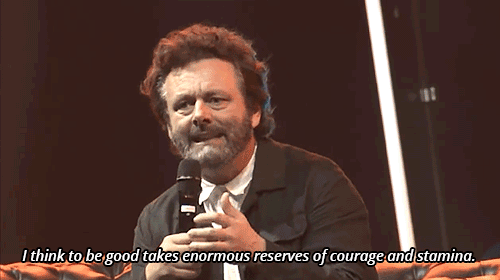
We as a society tend to sort of undervalue goodness. It’s sort of seen as sort of somehow weak and a bit nimby and “oh it’s nice.” And I think to be good takes enormous reserves of courage and stamina. I mean, you have to look the dark in the face to be truly good and to be truly of the light…. The idea that goodness is somehow lesser and less interesting and not as kind of muscular and as passionate and as fierce as evil somehow and darkness, I think is nonsense. The idea of being able to portray an angel, a being of love. I love seeing the things people have put online about angels being ferocious creatures, and I love that. I think that’s a really good representation of what goodness can be, what it should be, I suppose.
I was looking forward to BAMF!Aziraphale all season long, and I think that’s what we got in the end. Remember Neil said that the Job minisode was important for Aziraphale’s story. Remember how Aziraphale sat on that rock and reconciled to himself that he MUST go to Hell, because he lied and thwarted the will of God. He believed that––truly, honestly, with the faith of a child, but the bravery of a soldier.
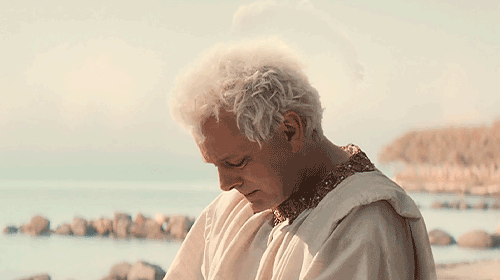
Aziraphale, a being of love with more goodness than all of Heaven combined, believed he needed to walk through the Gates of Hell because it was the Right Thing to do. (Like Job, he didn’t understand his sin but believed he needed to sacrifice his happiness to do the Right Thing.)
That’s why we saw Aziraphale as a soldier this season: the bookshop battle, the halo. But yes, the ending as well.
Because Aziraphale never wanted to go to Heaven, and he never wanted to go there without Crowley.
But it was Crowley who taught him that he could, even SHOULD, act when his moral heart told him something was wrong. While Crowley was willing to run away and let the world burn, it was Aziraphale (in that bandstand at the end of the world) who stood his ground and said No. We can make a difference. We can save everyone.

And Aziraphale knew he could not give up the ace up his sleeve (his position as an angel) to talk to God and make them see the truth in his heart.
I was messed up by Ineffable Bureaucracy (Boxfly) getting their happy ending when our Ineffable Husbands didn’t, but I see now that them running away served to prove something to Aziraphale. (And I am fully convinced that Gabriel and Beelzebub saw the example of the Ineffables at the Not-pocalypse and took inspiration from them for choosing to ditch their respective sides)
But my point is that Aziraphale saw them, and in some ways, they looked like him and Crowley. And he saw how Gabriel, the biggest bully in Heaven, was also like him in a way (a being capable of love) and also just a child when he wasn’t influenced by the poison of Heaven. Muriel, too, wasn’t a bad person. The Metatron also seemed to have grown more flexible with his morality (from Aziraphale's perspective). Like Earth, Heaven was shades of (light?) gray.
Aziraphale is too good an angel not to believe in hope. Or forgiveness (something he’s very good at it).
Aziraphale has been scarred by Heaven all his life. But with the cracks in Heaven’s armor (cracks he and Crowley helped create), Aziraphale is seeing something else. A chance to change them. They did terrible things to him, but he is better than them, and because of Crowley, he feels ready to face them.
(Will it work? Can Heaven change, institutionally? Probably not, but I can't blame Aziraphale for trying.)
At the cafe, the Metatron said something big was coming in the Great Plan. Aziraphale knows how trapped he had felt when he didn’t have God’s ear the first time something huge happened in the Big Plan. He can’t take a chance again to risk the world by not having a foot in the door of Heaven. That’s why we saw individual human deaths (or the threat of death) so much more this season: Elspeth, Wee Morag, Job’s children, the 1940s magician. Aziraphale almost killed a child when he couldn’t get through to God, and he’s not going through that again.
“We could make a difference.” We could save everyone.

Remember what Michael Sheen said about courage and doing good––and having to “look the dark in the face to be truly good.” That’s what happened when Aziraphale was willing to go to Hell for his actions. That’s what happened when he decided he had to go to Heaven, where he had been abused and belittled and made to feel small. He decided to willingly go into the Lion’s Den, to face his abusers and his anxiety, to make them better so that they would not try to destroy the world again.
Him, just one angel. He needed Crowley to be there with him, to help him be brave, to ask the questions that Heaven needed to hear, to tell them God was wrong. Crowley is the inspiration that drives Aziraphale’s change, Crowley is the engine that fuels Aziraphale’s courage.
But then Crowley tells him that going to Heaven is stupid. That they don’t need Heaven. And he’s right. Aziraphale knows he’s right.
Aziraphale doesn’t need Heaven; Heaven needs him. They just don’t know how much they need him, or how much humanity needs him there, too. (If everyone who ran for office was corrupt, how can the system change?)
Terry Pratchett (in the Discworld book, Small Gods) is scathing of God, organized religion, and the corrupt people religion empowers, but he is sympathetic to the individual who has real, pure faith and a good heart. In fact, the everyman protagonist of Small Gods is a better person than the god he serves, and in the end, he ends up changing the church to be better, more open-minded, and more humanist than god could ever do alone.
Aziraphale is willing to go to the darkest places to do the Right Thing, and Heaven is no exception. When Crowley says that Heaven is toxic, that’s exactly why Aziraphale knows he needs to go there. “You’re exactly is different from my exactly.”
____
In the aftermath of Trump's election in the US, Brexit happened in 2018. Michael Sheen felt compelled to figure out what was going on in his country after this shock. But he was living in Los Angeles with Sarah Silverman at the time, and she also wanted to become more politically active in the US.
Sheen: “I felt a responsibility to do something, but it [meant] coming back [to Britain] – which was difficult for us, because we were very important to each other. But we both acknowledge that each of us had to do what we needed to do.” In the end, they split up and Michael moved back to the UK.
Sometimes doing the Right Thing means sacrificing your own happiness. Sometimes it means going to Hell. Sometimes it means going to Heaven. Sometimes it means losing a relationship.
And that’s why what happened in the end was so difficult for Aziraphale. Because he loves Crowley desperately. He wants to be together. He wanted that kiss for thousands of years. He knows that taking command of Heaven means they would never again have to bow to the demands of a God they couldn’t understand, or run from a Hell who still came after them. They could change the rules of the game.
And he’s still going to do that. But it hurts him that he has to do that alone.
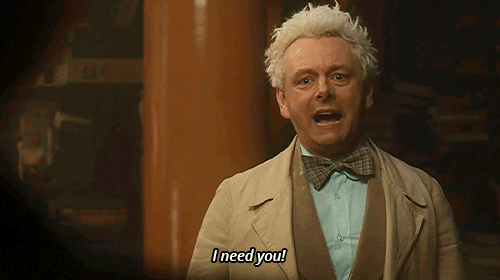
#good omens#good omens 2#ineffable husbands#it's kinda like capt america: civil war#with Azi as Tony Stark: traumatized and trying to do the right thing#and Crowley being Steve Rogers: fuck the establishment let's go rogue#gos2spoilers#good omens meta#good omens 2 meta#go s2#michael sheen#go s2 meta#go meta#*mine#*mymeta#ineffables husbands#ineffable soulmates#*mybest
11K notes
·
View notes
Text
Crowley and Job
I'm sure this has been written before but I haven't read it so here's my thesis:
The Job minisode is a metaphor for Crowley.
The Job minisode shows us that this God is willing to put her favourites through significant pain, to have them lose everything, to carry out the ineffable plan. In fact, God considers their favourites to be the only ones able to endure this and remain "faithful" or "good." Funny that, as we see Crowley - a Demon who has every reason to hate God and do a lot of evil - continually showing himself to have a stronger moral compass than the Archangels.
Job is stripped of absolutely everything he has, one after another. Starting with his livelihood, his possessions, his home and finally his most loved thing - his children (sounding familiar at all?). Crowley loses his status, his identity, his job, his flat and ultimately Aziraphale.
Job is angry but not at God, he's angry at himself. He questions how much he must have done wrong to not even know what it is he did (sound familiar?)
When Job talks to God at the end, the first thing she says to him is "You have questions for me Job?" and then she responds with a series of questions back to him. She isn't angry at him asking questions.
He then returns to Sitis, a broken man, to be saved by an Angel and a Demon who reinstate his children to him, having kept them safe the entire time.
How fortunate for God that a particular Angel and Demon pair have quietly ensured that some of the most disturbing plans of Heaven and Hell have never made it to fruition.
How interesting that we see Crowley going through each of the pains of Job.
At the end of S2, Crowley is metaphorically sitting, head in hands, wondering what he did that was so wrong to deserve this.
What if the answer is nothing? What if the answer is he did everything right?
#crowley#job minisode#good omens meta#good omens#good omens 3#god and Crowley#aziraphale#crowley and job#god good omens#foreshadowing#aziracrow#ineffable husbands
1K notes
·
View notes
Text
Good Omens is queering TV/storytelling - part 1: GAZE

I would argue that part of why Good Omens is so refreshingly queer is because it does not cater to the male gaze (which centers around the preferences - aesthetic, romantic, sexual, visual, logical, emotional, political ... - of mainly white men in positions of power):
no oversexualization of groups or types of people: Women or characters that could be read as female presenting are not overly sexualized. In fact, some of them are shown to be grimy, slimy and not sexual at all. All of them are real characters and not just cardboard-cutout on-screen versions of male misogynistic fantasies. They portray real people with real people problems. They are human, or exempt from our categories when portraying angels or demons. There are no overly sexualized bodies in general (as has so far also often been the case with young gay men, PoC, etc.), no fetishization of power imbalances, and not exclusively youthful depiction of love and desire.

sex or sexual behavior is not shown directly (yet): All imagery and symbolism of sex and sexuality is used not to entice the audience but is very intimately played out between characters, which makes it almost uncomfortable to watch (e.g., Aziraphale being tempted to eat meat, Crowley watching Aziraphale eat, the whole gun imagery).
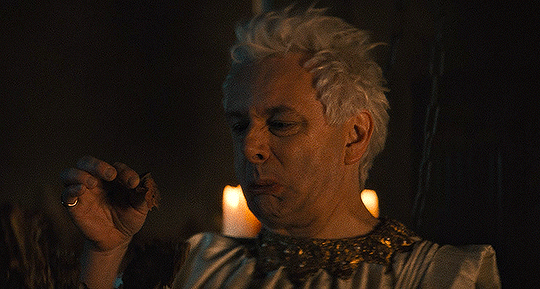
flaunting heteronormativity: Throughout GO but especially GO2, there is very little depiction of heterosexual/romantic couples; most couples are very diverse and no one is making a fuss about it. There is no fetishization of bodies or identities. Just people (and angels and demons) being their beautiful selves (or trying to).
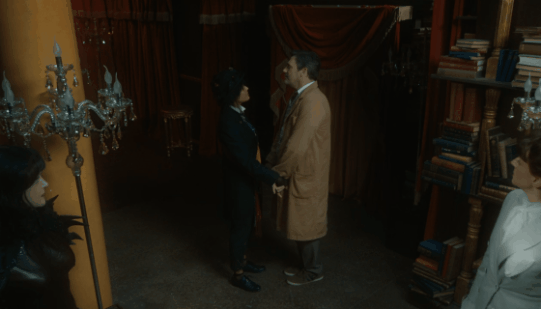
age: Even though Neil Gaiman explained that Crowley and Aziraphale are middle-aged because the actors are, I think it is also queering the idea of romance, love and desire existing mainly within youthful contexts. Male gaze has taught us that young people falling and being in love is what we have to want to see, and any depiction of love that involves people being not exactly young anymore is either part of a fetishized power imbalance (often with an older dude using his power to prey on younger folx) or presents us with marital problems, loss of desire, etc. – all with undertones of decay and patronizing sympathy. Here, however, we get a beautifully crafted, slow-burn, and somehow super realistic love story that centers around beings older than time and presenting as humans in their 50s figuring out how to deal with love. It makes them both innocent and experienced, in a way that is refreshing and heartbreaking and unusual and real.
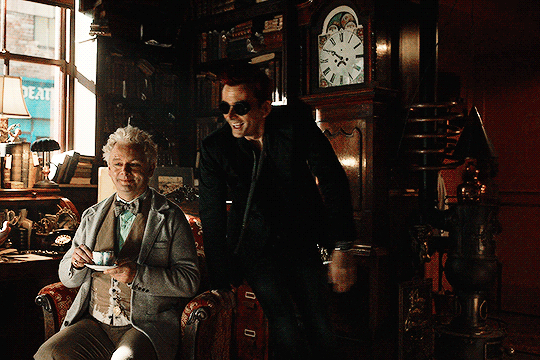
does not (exclusively) center around romantic/sexual love: I don’t know if this is a gaze point exactly but I feel like male gaze and resulting expectations of what a love story should look like are heavily responsible for our preoccupation with romantic/sexual love in fiction – the “boy gets girl” type of story. And even though, technically, GO seems to focus on a romantic love story in the end, it is also possible to read this relationship but also the whole show as centering around a kind of love that goes beyond the narrow confines of our conditioned boxed-in thinking. It seems to depict a love of humanity and the world and the universe and just the ineffability of existence as a whole.
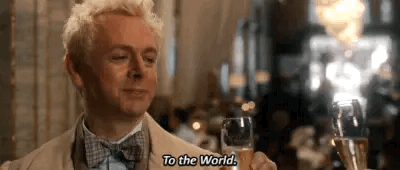
disability as beautiful and innate to existence: Disability is represented amongst angels by the extremely cool Saraqael and by diversely disabled unnamed angels in the Job minisode. Representation of disability is obviously super important in its own right, but is also queers what we perceive as aesthetically and ontologically "normal". Male gaze teaches us that youth and (physical and mental) health are the desirable standard and everything else is to be seen as a deviance, a mistake. By including disability among the angels, beings that have existed before time and space, the show clearly states that disability is a beautiful and innate part of existence.
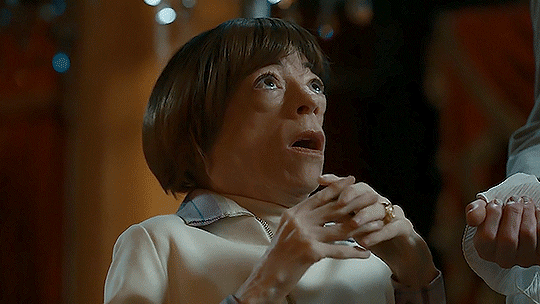
gender is optional/obsolete: Characters like Crowley, Muriel and others really undermine the (visual and aesthetic) boundaries of gender and the black-and-white thinking about gender that informs male gaze. Characters cannot be identfied simply as (binary) men or women anymore just by looking at them or by interpreting their personalities or behaviors. Most characters in GO, and especially the more genderqueer ones, display a balance of feminine and masculine traits as well as indiosyncracies that dissolve the gender binary.
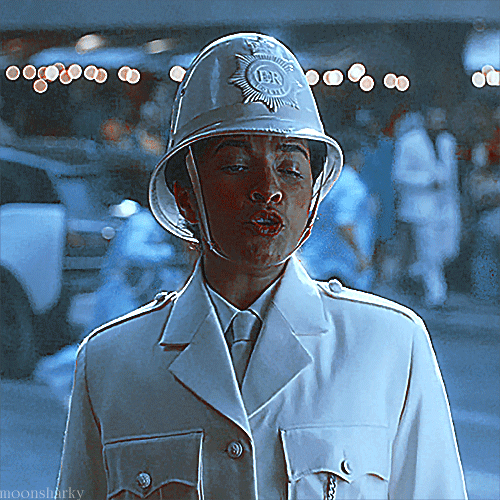
Feel free to add your own thoughts on this in the comments or tags!
#good omens s2#good omens#good omens 2#go2#good omens meta#ineffable husbands#crowley#aziraphale#queer#queer TV#male gaze#thank you neil gaiman for cranking up the queer#neil gaiman#thank you neil gaiman
2K notes
·
View notes
Text
The job minisode is so fun and funny until you realise that the speech crowley gives to the goats he has to destroy is a speech he might as well have given to himself. “You should know why you’re about to die, god has abandoned you, the god who claims to love you and demands your praise has given you up to be destroyed. Bad luck.”
And THEN when a despairing job sits in the evidence of fire and says “how sunk in sin must i be not only to deserve all this but not even to know why” it HITS. It’s like crowley isn’t it… he doesn’t understand why he had to fall…. is he evil… why has god forsaken him…….
2K notes
·
View notes
Text
Me: My heart is so full 🥰
My heart:

#this is so stupid but it’s been sitting in my drafts#I love them so much#this is so ugly I can’t stop laughing hskshksjsnsj#crowley my beloved#aziraphale my precious#the job minisode#good omens
24 notes
·
View notes